Related Research Articles

Mao Zedong, also known as Chairman Mao, was a Chinese politician, political theorist, military strategist, poet, and revolutionary who was the founder of the People's Republic of China (PRC). He led the country from its establishment in 1949 until his death in 1976, while also serving as the chairman of the Chinese Communist Party (CCP) during that time. His theories are known as Maoism.

Yang Shangkun was a Chinese Communist military and political leader, president of the People's Republic of China from 1988 to 1993, and one of the Eight Elders that dominated the party after the death of Mao Zedong.
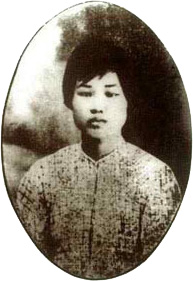
Yang Kaihui was the second wife of Mao Zedong, whom he married in 1920. She had three children with Mao Zedong: Mao Anying, Mao Anqing, and Mao Anlong. Her father was Yang Changji, the head of the Hunan First Normal School and one of Mao's favorite teachers.
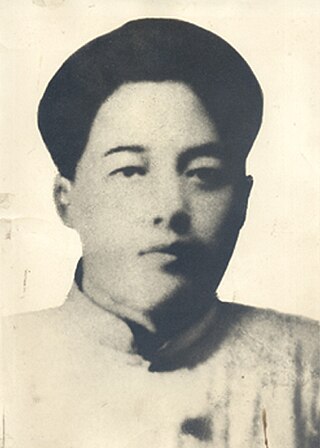
Mao Zetan was a younger brother of Mao Zedong. He joined the Chinese Communist Party in 1923. In 1927, he participated in the Nanchang Uprising, retreating with the Communists to the Jinggang Mountains at its completion.
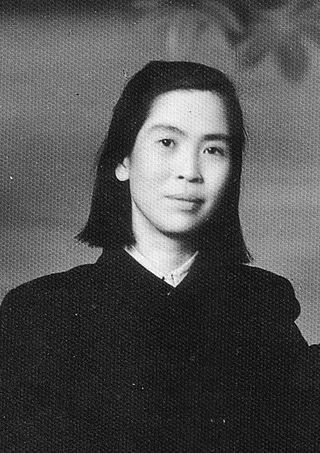
He Zizhen was a Chinese soldier, revolutionary, and politician who was the third wife of Chairman Mao Zedong from 1928 to 1937 and participated in the Long March.

Mao Anying was a Chinese military officer. He was the eldest son of Mao Zedong and Yang Kaihui. Educated in Moscow and a veteran of multiple wars, Mao was killed in action by an air strike during the Korean War.
Reply to Li Shuyi is a poem written on May 11, 1957 by Mao Zedong to Li Shuyi, a friend of Mao's first wife Yang Kaihui and the widow of the executed Communist leader Liu Zhixun. In the poem, "poplar" refers to Yang Kaihui, whose surname Yang means "poplar", and who also had been executed; and "willow" is the literal meaning of Liu's surname. Wu Gang is a man who, according to Chinese legend, lives on the moon, and was forced by the gods to fell a laurel tree forever.
Luo Yixiu, a Han Chinese woman, was the first wife of the later Chinese communist revolutionary and political leader Mao Zedong, to whom she was married from 1908 until her death. Coming from the area around Shaoshan, Hunan, in south central China – the same region as Mao – her family were impoverished local landowners.

Mao Anqing was the last surviving son of Mao Zedong, Chairman of the Chinese Communist Party. He was the second son of Mao and his wife, Yang Kaihui. He had a mental illness, possibly schizophrenia. He worked as a translator and never became active in politics.

Mao Xinyu is a grandson of Mao Zedong and a major general in the People's Liberation Army (PLA) of the People's Republic of China.
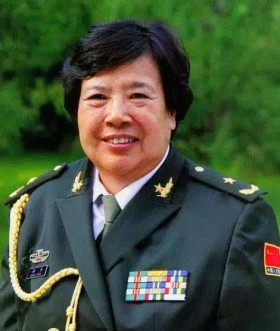
Shao Hua, formerly known as Zhang Shaohua, was a Chinese photographer and a major general in the People's Liberation Army. She was the wife of Mao Anqing, the second son of Mao Zedong.
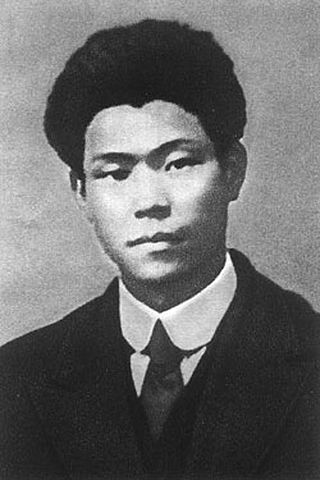
Cai Hesen was an early leader of the Chinese Communist Party (CCP), and a friend and comrade of Mao Zedong. Cai was born in Shanghai but grew up in Shuangfeng County in Hunan Province of China. He helped Mao organize the Changsha New People's Study Society. In 1919 he went to France on the Work-Study program, and his letters of advocacy were important in convincing Mao of the Bolshevik revolutionary approach. On his return to China, he was an important leader and organizer for the young Communist Party, spent several years in Moscow, and returned to China again in 1931. While organizing revolutionary activity in Hong Kong, he was arrested and given over to Canton authorities, who executed him in August 1931.
Events in the year 1950 in the People's Republic of China.

Li Rui was a Chinese politician, historian and dissident Chinese Communist Party (CCP) member.

Former Residence of Mao Zedong or Mao Zedong's Former Residence was built in the late Qing dynasty (1644–1911). It is located in Shaoshan Village of Shaoshan Township in Shaoshan, Xiangtan, Hunan, China. The building was the birthplace and childhood home of Mao Zedong, the first leader of the People's Republic of China. It has a building area of about 472.92-square-metre (5,090.5 sq ft), embodies buildings such as the old houses, the Mao Zedong Memorial Hall, the Bronze Statue of Mao Zedong, the Cultural relics Exhibition Hall, and the Dishui Hole.
Events from the year 1930 in China.
Mao Zedong is a 2013 Chinese epic biographical television series which dramatises the life of Mao Zedong, former Chairman of the Chinese Communist Party and the main founder of the People's Republic of China. It was directed by Gao Xixi, and starred Tang Guoqiang, Liu Jing, Li Bowen, Guo Lianwen, and Wang Wufu. The television series was released in 2013 to mark the 120th anniversary of the birth of Mao Zedong.
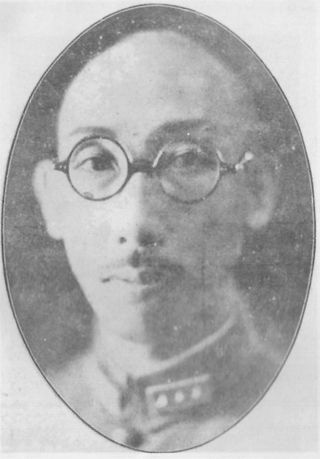
He Jian was a Chinese Nationalist (KMT) general and politician in the Republic of China. He was governor of Hunan province between 1929 and 1937, and Interior Minister from 1937 to 1939. He was best known for fighting the Communists, and he once ordered his subordinates to execute Yang Kaihui and Wu Ruolan.

Liu Zhixun, also known as Liu Keming, was a member of the Chinese Workers' and Peasants' Red Army. He was purged by Chinese Communist Party leader Xia Xi and executed.

Wang Guangying was a Chinese entrepreneur and politician. He was one of the most prominent "red capitalists", a title bestowed on him by Premier Zhou Enlai. He founded Modern Chemical Works in the 1940s and served as Founding Chairman of China Everbright Group in the 1980s. His sister Wang Guangmei was the wife of President Liu Shaoqi, and for that connection he was persecuted and imprisoned during the Cultural Revolution, when Liu was ousted by Chairman Mao Zedong. Wang was rehabilitated after Mao's death and served as Vice Chairperson of the Chinese People's Political Consultative Conference (CPPCC) and Vice Chairperson of the National People's Congress (NPC).
References
- 1 2 Fenby, Jonathan (2007-03-25). "Mao's forgotten son dies". the Guardian. Retrieved 2019-01-29.
- ↑ Barme, Geremie (1996). Shades of Mao: The Posthumous Cult of the Great Leader. Armonk, NY: M.E. Sharpe. ISBN 1563246783.